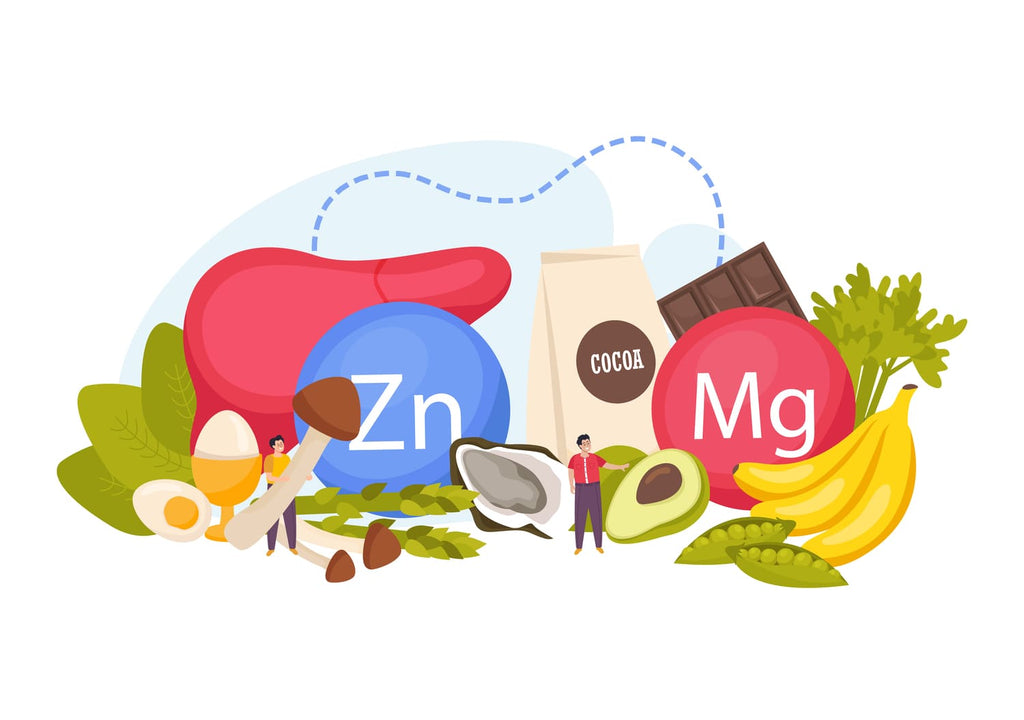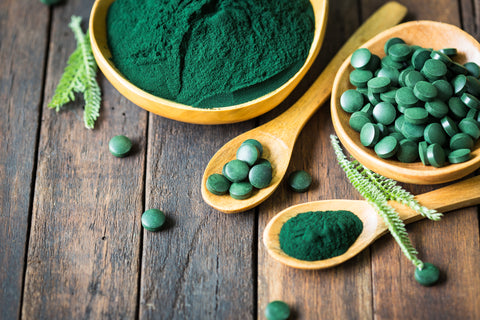Interactions between individual Vitamins, Minerals and Trace Elements can have a significant effect on their absorption and bioavailability. In some cases, they can lead to deficiencies and health problems.
For instance, regular intake of supplemental Vitamin D may gradually lead to Magnesium deficiency, which has been linked to sleep problems.
Therefore, those who take Vitamin D supplements should be encouraged to take Magnesium supplements (200mg twice daily). This is to prevent deficiency and ensure the proper conversion of Vit D into its active form.
Below are more examples of various interactions:
Vitamin A
-
Vitamin A and Beta-Carotene may enhance Iron absorption, especially non-heme iron
-
Supplementing with Vit A may help regulate Iron deficiency anaemia in children
-
Severe deficiency decreases the uptake of Iodine and can affect thyroid metabolism
-
Excess Vit A may obstruct the absorption of Vitamin K
-
High levels of Beta-Carotene may decrease serum levels of Vit E
-
High levels of Vit A can decrease Vit D uptake by 30 percent
-
Vit A requires Zinc for proper absorption and utilisation
-
Iron might increase the bioavailability of pro-Vitamin A carotenoids
-
Ascorbic Acid minimises toxicity of Vit A overdose
Vitamin D
-
Vitamin D assists in the absorption of Calcium (without Vit D and K, Calcium cannot be absorbed by the bones. Instead, it is deposited in the kidneys and arteries which contributes to kidney stones)
-
Vitamin D aids in the absorption of Phosphorus
-
Vit K supports the absorption of Vit D supplements and Vit K2 prevents the calcification of soft tissue. (You should aim to take at least 50mcg of Vit K2 for every 1000IU of Vitamin D3)
-
High levels of Vit A could decrease Vit D uptake by 30%
-
High levels of Vitamin E possibly reduce Vit D uptake
-
Severe Vit D deficiency in children could lead to rickets, a disease that softens and weakens bones
In a case reported in the Lancet, children with rickets received massive doses, 6million IU of Vit D over 10 days, without any improvement after six weeks. When they were treated with Magnesium because of low serum levels, the rickets promptly disappeared.
-
Vitamin D is associated with Calcium absorption. In another case study published in "The American Journal of Clinical Nutrition," Vit D treatment did not resolve low blood Calcium in five patients”
Patients were given Magnesium because of low levels, as a result the Calcium levels quickly returned to normal. According to the study's authors, Magnesium may promote the release of Calcium in the presence of Vitamin D.
-
Silica may increase the overall benefits of Vitamin D
-
Boron minimises the breakdown of Vit D thus increasing the amount of time Vit D stays in the blood and the total amount of Vit D available to the body (1)
Vitamin E
-
Vitamin E can boost Vit A absorption, up to 40%
-
Vit E may minimise Selenium toxicity
-
Medium and high levels of Vitamin E potentially reduce Vit D uptake
-
Ascorbic Acid helps regenerate Vit E
-
CoQ10 helps regenerates Vitamin E
-
High levels of beta-carotene may decrease serum levels of Vit E
Vitamin K
-
Vitamin K aids the absorption of Calcium
-
Vit K may improve the absorption of Vitamin D supplements and Vit K2 minimises some of the problems of excess Vit D (such as calcification of soft tissue)
-
Vitamin E interferes with Vit K absorption
-
Excess Vit A interferes with absorption of Vit K

Vitamin C (Ascorbic Acid)
-
Vit C significantly improves absorption of Iron
-
Ascorbic Acid helps regenerate Vitamin E
-
Ascorbic Acid may increase absorption of sodium selenite and retention of Selenium
-
Over time, excessive Vit C supplementation may lead to copper deficiency
-
Mega doses of Vitamin C may counteract its positive effect on iron
-
Vit C might degrade B12 especially when B1 and copper are also present
-
Ascorbic Acid is regenerated by glutathione
Vitamin B1 (Thiamine)
-
Vitamin B1 helps increase the absorption of B2
-
Very high levels of B1 may interfere with absorption of B2
-
Magnesium assists in the process of the conversion of B1 to its biologically active form and for thiamine-dependent enzymes. Overcoming thiamine (B1) deficiency might not occur if magnesium deficiency is not addressed
-
Vitamin B6 can inhibit the production of Thiamine (B1)
Vitamin B2 (Riboflavin)
-
Without B2, the absorption of B3, B6, Folate, B12, Iron and Zinc may be delayed
-
Thiamine helps increase absorption of B2
-
Very high levels of B1 may interfere with absorption of B2
-
Calcium may form a chelate with Riboflavin (B2), decreasing its absorption
-
Vitamin B5 helps the body to be able to effectively utilise Vitamin B2
-
Molybdenum interacts with Riboflavin to infuse iron and haemoglobin, which contributes to the development of healthy red blood cells
Vitamin B3 (Niacin)
-
Niacin helps increase the absorption of B2 and B6
-
Nicotinic acid (B3) might improve Zinc and antioxidant marker levels
-
B3 is made in the body from amino acid Tryptophan (5-HTP). However, this conversion involves B1 and B6
-
B12 deficiency may lead to loss of B3 in our urine

Vitamin B5 (Pantothenic Acid)
-
Mega dosages of Biotin may lead to B5 deficiency and skin problems (acne flares, etc.)
-
B5 requires B12, Folate and Biotin for adequate absorption
-
Copper deficiency raises Vitamin B5 requirements
-
Too much Copper may reduce the absorption and effectiveness of B5
-
Pantothenic Acid helps the body to be able to effectively use B2
Vitamin B6 (Pyridoxine)
-
B6 helps improve absorption of Niacin, Riboflavin, Folate and Zinc
-
B6 enhances the uptake of Magnesium and vice versa
-
Vitamin B6 can inhibit the production of thiamine (B1)
-
High levels of B6 may increase the need for Zinc
-
Pyridoxine deficiency boosts uptake of Zinc, but serum Zinc levels may decrease, demonstrating problems in zinc utilisation
Folic Acid/Folate (Vitamin B9)
-
Folic Acid masks B12 deficiency (in people who take Folic Acid supplements and are deficient in B12, it is very difficult to detect deficiency)
-
More than 1,000 mcg of Folic Acid per day can cause symptoms of B12 deficiency
-
Folate also requires B1, B2, B3
-
Folic acid requires B12 (B12 deficiency leads to folic acid deficiency) As Vitamin B12 is responsible for converting folic acid back into its bioactive form after various reactions
Without B12, the body quickly suffers a functional folic acid deficiency, since the folic acid is left stuck inside our body in its unusable form. There is clearly enough folic acid present, but it cannot be converted.
Vitamin B12 (Cobalamin)
-
B12 is required by Folic Acid
-
Supplementing with B12 increases the need for Folic Acid and vice versa because both play key roles in the methylation cycle
-
B12 requires B6 for absorption
-
Vit E is involved in the conversion of inactive B12 to active form
-
Folic acid masks B12 deficiency
-
More than 1,000 mcg of supplemental Folic Acid per day can cause symptoms of B12 deficiency
-
Vit C might degrade B12 especially when B1 and copper are also present
-
B12 in the form of adenosylcobalamin requires Biotin for conversion
-
Taking B12 supplements increases the need for more Potassium
More B12 equals less potassium and vice versa. However, if you increase your intake of raw vegetables this should decrease your chances of becoming deficient.
-
Although B12 is considered very safe, taking only one of any B Vitamins for a long period of time can result in an imbalance of other B Vitamins. It is, therefore, recommended to take B12 with a good B complex formula or multivitamins and Minerals (such as Healthy Mega) that include all high strength B Vitamins
-
Several drugs, such as Metformin, may lead to B12 deficiency
-
Spirulina contains a "fake” B12 which is chemically similar to real B12. It bonds to the same transport molecule as real B12
However, since it has no effect on the body it can lead to B12 deficiency. For this reason, those who consume spirulina on a regular basis should take 2000 IU of real B12 every day, after breakfast.

Biotin (Vitamin B7)
-
B5 requires Biotin for adequate absorption
-
Mega dosages of Biotin may lead to B5 deficiency and skin problems
-
Biotin leads to deficiency of B5 as both Biotin and Pantothenic Acid (B5) are absorbed from the intestines by the same receptors
Pantothenic Acid regulates the barrier function of the surface layer on skin. Therefore, a deficiency of Pantothenic Acid (through excess of Biotin) could lead to skin problems such as acne flares.
-
Cysteine plays important role in the breakdown of Biotin
-
Biotin is destroyed by free radicals, so taking additional Biotin is recommended in cases of stress and high-performance sport, as the body’s Biotin requirement increases enormously
-
Alpha lipoic acid (ALA) may compete with Biotin and interfere with its activity. For this reason, biotin supplementation is recommended if the daily intake of ALA exceeds 200mg
Choline
-
Choline can interact with Folate
Calcium
-
Calcium can lead to Magnesium deficiency and may increase the risk of heart attack, muscle cramps, etc.
-
Calcium potentially impairs the absorption of Iron
-
Calcium may impair Zinc absorption, but only in the presence of phytate
-
Calcium may form a chelate with Riboflavin (B2), decreasing its absorption
-
High levels of Calcium supplements may decrease Phosphorus absorption
-
Without Vitamin D and K Calcium can’t be absorbed by bones but instead is deposited in kidneys and arteries contributing to kidney stones.
Regular Calcium supplementation requires also Magnesium (200mg twice daily), Vitamin K2 (200mcg daily) and Vitamin D3 (2000-5000IU daily).
-
Potassium enhances Calcium reabsorption
-
Silica may increase the overall benefits of Calcium
Magnesium
-
Calcium can lead to Magnesium deficiency and may increase the risk of heart attack, muscle cramps, etc.
-
High levels (142mg/day) of Zinc might reduce Magnesium absorption
-
Vitamin B6 potentially improves the absorption of Magnesium (Vitamin B6 increases the amount of Magnesium that our cells can absorb). At the same time Magnesium enhances the uptake of Pyridoxine
-
Magnesium assists in the process of the conversion of B1 to its biologically active form and for thiamine-dependent enzymes. Overcoming thiamine (B1) deficiency might not occur if magnesium deficiency is not addressed
-
Magnesium is required for Potassium uptake
-
Over time, Vit D supplements can lead to Magnesium deficiency, as Vit D uses Magnesium
Magnesium deficiency causes Vit D to be stored and inactive (useless). In people who are deficient in magnesium, Vitamin D supplementation may not work at all, even in high doses taken over a long period of time.

Zinc
-
Zinc without Copper may lead to Copper deficiency because Zinc and Copper compete for absorption in the stomach, with Zinc being the usual winner. As a result, Copper isn’t absorbed.
To solve this problem, you should take Zinc with Copper (0.5-1mg daily).
-
50mg of Zinc per day can reduce Iron and Copper levels
-
Zinc potentially impairs Iron absorption, but it doesn’t cause Iron deficiency if Zinc supplements are taken with meals
-
High levels (142 mg/day) of Zinc might reduce Magnesium absorption
-
Supplementing with Nicotinic Acid (B3) may improve Zinc levels
-
Iron, Copper and Calcium supplements may compete with Zinc for absorption
Iron
-
Iron is needed for converting Beta-Carotene into retinol (Vitamin A)
-
Iron increases the bioavailability of pro-Vitamin A carotenoids
-
Iron may reduce the absorption of Zinc
-
Vitamin A can increase Iron absorption, especially non-heme iron
-
Supplementing with Vit A might help reverse Iron deficiency anaemia
-
Alpha lipoic acid (ALA) deters Iron toxicity
Potassium
-
Potassium encourages the kidneys to excrete Sodium which promotes healthy blood pressure levels
-
Potassium enhances Calcium reabsorption
-
Magnesium is required for Potassium uptake
-
Potassium supplements should be taken with B12 and vice versa, as B12 supplements increase the need for Potassium
More B12 equals less Potassium and vice versa. However, if you increase your intake of raw vegetables this should decrease your chances of becoming deficient.
Copper
-
Copper is needed for Iron transport between tissues
-
Copper deficiency increases Vitamin B5 requirements
-
Copper may reduce absorption and effectiveness of B5. On the other hand, Copper deficiency increases Vitamin B5 requirements
-
Over 1000mg of Vit C a day may interfere with Copper absorption
-
Zinc supplementation without Copper can lead to Copper deficiency because Zinc and Copper compete for absorption in the stomach, with Zinc being the usual winner. As a result, Copper isn’t absorbed.
To solve this problem, you should take Zinc with Copper (0.5-1mg daily).

Selenium
-
Selenium is required to keep Glutathione in its active form
-
Selenium deficiency may increase the effects of Vitamin E deficiency
-
Vitamin E can minimise selenium toxicity
Chromium
-
Chromium uptake is enhanced when taken with Vitamin C. Administration of 100mg of Vitamin C together with 1mg of Chromium resulted in higher levels of Chromium than 1 mg of Chromium without Ascorbic Acid
Iodine
-
Severe Vitamin A deficiency may decrease the uptake of Iodine and can affect thyroid metabolism
Manganese
-
Manganese may affect Iron absorption as the intestines cannot differentiate between Manganese and Iron. High Manganese intake through black and green tea drinks can often causes iron deficiency
-
Manganese and Calcium often compete for absorption

Molybdenum
-
Molybdenum has been shown to cause Copper deficiency. It is therefore suggested to take 0.5-1mg of Copper with Molybdenum.
-
Molybdenum helps to remove excess Copper in the body, Molybdenum has been used to treat high concentrations of Copper
On the other hand, if the levels of Copper are normal or low, Molybdenum and Zinc, should be taken with small amount of Copper (0.5 – 1 mg).
-
High Molybdenum levels can cause gout-like symptoms, due to an increase in uric acid levels
-
Some users experience gas, diarrhoea and stomach upset as a result of supplementing with 100μg per day
-
High doses of Molybdenum have been shown to block Tylenol
-
Molybdenum interacts with Vitamin B2 to infuse Iron and haemoglobin, thus contributing to the development of healthy red blood cells
Boron
-
Boron may prevent the breakdown of Vitamin D which increases the amount of time Vitamin D stays in the blood and the total amount of Vitamin D available to the body (1)
When taken with Vit D, Boron increases its amount and effectiveness in the body.
- It is probably better to avoid Boron supplements if you suffer from kidney problems because the kidneys work very hard to remove Boron from the body
Phosphorus
-
High levels of Calcium may decrease Phosphorus absorption
Sodium Bicarbonate
-
Sodium Bicarbonate can lead to Potassium deficiency
-
Excess Sodium enhances Calcium excretion
Silica
-
Silica helps increase the overall benefits of Vitamin D, Glucosamine and Calcium
Related Articles
Sources
- https://www.ijres.org/papers/Volume-10/Issue-4/Ser-6/H10043842.pdf
- https://deannaminich.com/top-vitamin-mineral-interactions-you-need-to-know-about/
- https://www.nordic.com/healthy-science/vitamins-and-minerals-interactions-to-avoid/
- https://pubmed.ncbi.nlm.nih.gov/28471760/
- https://blog.metagenics.com/wp-content/uploads/2020/04/MET2557_Vitamin-Mineral_Interactions_Chart.pdf
- https://www.health.harvard.edu/newsletter_article/Nutritions-dynamic-duos
Images: Image by freepik Image by jcomp on Freepik Image by macrovector on Freepik Image by Racool_studio on Freepik Image by flatart on Freepik
Any information or product suggested on this website is not intended to diagnose, treat, cure, or prevent any medical condition. Never disregard medical advice or delay in seeking it because of something you have read on this website. Consult your primary healthcare physician before using any supplements or making any changes to your regime.




